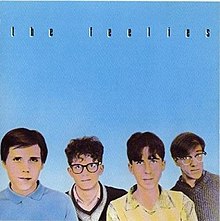
Talking Heads were an American rock band formed in New York City during 1975. The band was composed of David Byrne, Chris Frantz (drums), Tina Weymouth (bass), and Jerry Harrison. Described as "one of the most critically acclaimed groups of the '80s," Talking Heads helped to pioneer new wave music by combining elements of punk, art rock, funk, and world music with "an anxious yet clean-cut image"; they have been called "a properly postmodernist band."

With the Beatles is the second studio album by the English rock band the Beatles. It was released in the United Kingdom on 22 November 1963 on Parlophone, eight months after the release of the band's debut album, Please Please Me. Produced by George Martin, the album features eight original compositions and six covers. The sessions also yielded the non-album single, "I Want to Hold Your Hand" backed by "This Boy". The cover photograph was taken by the fashion photographer Robert Freeman and has since been mimicked by several music groups. A different cover was used for the Australian release of the album, which the Beatles were displeased with.

Creedence Clearwater Revival, commonly abbreviated as CCR or simply Creedence, was an American rock band formed in El Cerrito, California. The band consisted of lead vocalist, lead guitarist, and primary songwriter John Fogerty, his brother, rhythm guitarist Tom Fogerty, bassist Stu Cook, and drummer Doug Clifford. These members had played together since 1959, first as the Blue Velvets and later as the Golliwogs, before settling on Creedence Clearwater Revival in 1967. The band's most prolific and successful period between 1969 and 1971 produced fourteen consecutive Top 10 singles and five consecutive Top 10 albums in the United States, two of which—Green River (1969) and Cosmo's Factory (1970)—topped the Billboard 200 chart. The band performed at the 1969 Woodstock festival in Upstate New York, and was the first major act signed to appear there.
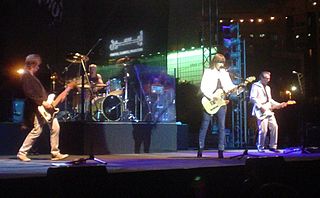
The Pretenders are a British-American rock band formed in March 1978. The original band consisted of founder and main songwriter Chrissie Hynde, James Honeyman-Scott, Pete Farndon and Martin Chambers. Following the deaths of Honeyman-Scott in 1982 and Farndon in 1983, the band experienced numerous personnel changes; Hynde has been the band's only continuous member.

My Generation is the debut studio album by English rock band the Who, released on 3 December 1965 by Brunswick Records in the United Kingdom, and Festival Records in Australia. In the United States, it was released on 25 April 1966 by Decca Records as The Who Sings My Generation, with a different cover and a slightly altered track listing. Besides the members of the Who, being Roger Daltrey (vocals), Pete Townshend (guitar), John Entwistle (bass) and Keith Moon (drums), the album features contributions by session musician Nicky Hopkins (piano).

Damn the Torpedoes is the third studio album by the American rock band Tom Petty and the Heartbreakers, released on October 19, 1979. It was the first of three Tom Petty albums originally released by the Backstreet Records label, distributed by MCA Records. It built on the commercial success and critical acclaim of the band's two previous albums and reached No. 2 on the Billboard 200 chart. The album went on to become certified triple platinum by the Recording Industry Association of America (RIAA).
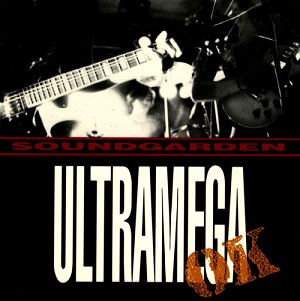
Ultramega OK is the debut studio album by American rock band Soundgarden, released on October 31, 1988, by SST Records. Following the release of the EPs Screaming Life (1987) and Fopp (1988), both for the Sub Pop record label, Soundgarden signed with SST and went to work on their debut full-length. The resulting album contained elements of heavy metal, psychedelic rock, and hardcore punk. The band supported the album with a tour of the United States, as well as its first overseas tour.

The Shins is an American indie rock band formed in Albuquerque, New Mexico, in 1996. The band is the project of singer-songwriter James Mercer, who has served as the band's sole constant member throughout numerous line-up changes. The band's current line-up consists of Mercer, alongside Yuuki Matthews, Mark Watrous, Patti King (keyboards), and Jon Sortland (drums). They are based in Portland, Oregon.

I Just Can't Stop It is the debut studio album by British two-tone band the Beat, released on 23 May 1980 by Go-Feet Records in the United Kingdom. It was released the same year in the United States on Sire Records, with the band credited as "The English Beat"; in Australia, it was released on Go-Feet under the band name "The British Beat".

Metal Box is the second studio album by Public Image Ltd, released by Virgin Records on 23 November 1979. The album takes its name from the round metal canister which contained the initial pressings of the record. It was later reissued in standard vinyl packaging as Second Edition in February 1980 by Virgin Records in the United Kingdom, and by Warner Bros. Records and Island Records in the United States.
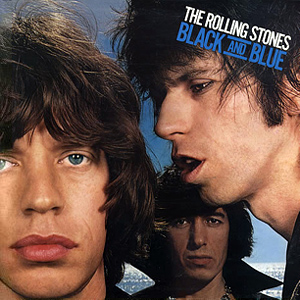
Black and Blue is the thirteenth studio album by the English rock band the Rolling Stones, released on 23 April 1976, by Rolling Stones Records.
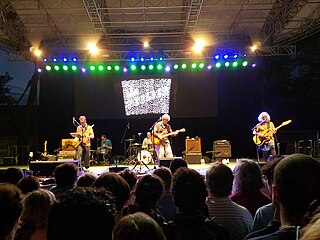
The Feelies are an American rock band from Haledon, New Jersey. They formed in 1976 and disbanded in 1992 after having released four albums. The band reunited in 2008, and released new albums in 2011 and 2017.
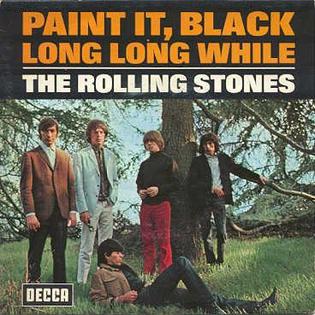
"Paint It Black" is a song by the English rock band the Rolling Stones. A product of the songwriting partnership of Mick Jagger and Keith Richards, it is a raga rock song with Indian, Middle Eastern and Eastern European influences and lyrics about grief and loss. London Records released the song as a single on 7 May 1966 in the United States, and Decca Records released it on 13 May in the United Kingdom. Two months later, London Records included it as the opening track on the American version of the band's 1966 studio album Aftermath, though it is not on the original UK release.

Cheap Trick is the debut studio album by the American rock band Cheap Trick, released in 1977. It was released under Epic Records and produced by Jack Douglas, a frequent collaborator of the band. The album did not reach the Billboard 200 chart but did "bubble under" at number 207 for one week in April 1977.

Grizzly Bear was an American rock band from Brooklyn, New York, formed in 2002. For most of its tenure, the band has consisted of Edward Droste, Daniel Rossen, Chris Taylor, and Christopher Bear. The band employed both traditional and electronic instruments, and their sound has been categorized as chamber pop, psychedelic folk, and art rock. The band was known for their use of vocal harmony, with all four members contributing vocals and lead vocals alternating between Rossen and Droste.

Music for Pleasure is the second studio album by English punk rock band the Damned. It was released on 18 November 1977 by Stiff Records. The album failed to chart in the UK.

The Good Earth is the second album by American alternative rock band the Feelies. It was released in 1986 on Coyote Records, six years following their debut album Crazy Rhythms. The original LP was contained in a sleeve designed by Glenn Mercer, featuring a front cover photo of the band by bassist Brenda Sauter and a back cover photo by John Baumgartner with coloring by Sauter.

Only Life is the third album by the American rock band the Feelies, released in 1988. It was made with the same line-up that appeared on the band's previous album, The Good Earth. The album contains a cover of the Velvet Underground's "What Goes On".

Time for a Witness is the fourth studio album by the American rock band the Feelies, released in 1991 on A&M/Coyote. The band supported the album with a North American tour.

Citizen is an American rock band from Southeast Michigan and Northwest Ohio that formed in 2009. The band currently consists of Mat Kerekes (vocals), brothers Nick and Eric Hamm (bass), Mason Mercer, and Ben Russin (drums). They are currently signed to Run for Cover Records, and have released five studio albums to date: Youth (2013), Everybody Is Going to Heaven (2015), As You Please (2017), Life in Your Glass World (2021), and Calling the Dogs (2023). Considered a part of emo's fourth wave, Pitchfork has described Citizen as "a band their fans can grow up with rather than out of".
